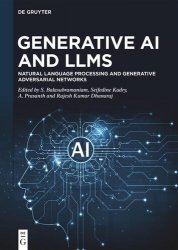Generative AI and LLMs Natural Language Processing and Generative Adversarial Networks
- Добавил: literator
- Дата: 15-09-2024, 16:32
- Комментариев: 0
 Название: Generative AI and LLMs Natural Language Processing and Generative Adversarial Networks
Название: Generative AI and LLMs Natural Language Processing and Generative Adversarial NetworksАвтор: S. Balasubramaniam, Seifedine Kadry, A. Prasanth, Rajesh Kumar Dhanaraj
Издательство: De Gruyter
Год: 2024
Страниц: 289
Язык: английский
Формат: True EPUB, MOBI
Размер: 10.1 MB
Generative Artificial Intelligence (GAI) and Large Language Models (LLM) are Machine Learning algorithms that operate in an unsupervised or semi-supervised manner. These algorithms leverage pre-existing content, such as text, photos, audio, video, and code, to generate novel content. The primary objective is to produce authentic and novel material. In addition, there exists an absence of constraints on the quantity of novel material that they are capable of generating. New material can be generated through the utilization of Application Programming Interfaces (APIs) or natural language interfaces, such as the ChatGPT developed by Open AI and Bard developed by Google.
The field of Generative Artificial Intelligence (GAI) stands out due to its unique characteristic of undergoing development and maturation in a highly transparent manner, with its progress being observed by the public at large. The current era of Artificial Intelligence is being influenced by the imperative to effectively utilise its capabilities in order to enhance corporate operations. Specifically, the use of large language model (LLM) capabilities, which fall under the category of Generative AI, holds the potential to redefine the limits of innovation and productivity. However, as firms strive to include new technologies, there is a potential for compromising data privacy, long-term competitiveness, and environmental sustainability.
This book delves into the exploration of Generative Artificial Intelligence (GAI) and LLM. It examines the historical and evolutionary development of generative AI models, as well as the challenges and issues that have emerged from these models and LLM. This book also discusses the necessity of generative AI-based systems and explores the various training methods that have been developed for generative AI models, including LLM pretraining, LLM fine-tuning, and reinforcement learning from human feedback. Additionally, it explores the potential use cases, applications, and ethical considerations associated with these models. This book concludes by discussing future directions in generative AI and presenting various case studies that highlight the applications of generative AI and LLM.
In the field of Machine Learning algorithms, Generative Artificial Intelligence (GAI) is a paradigm that helps the machines in generating materials that are unique and also mimics the human-generated data values. On this basis, GAI also helps in the recognition and also recreation of the basic trends and structures that follow the set of rules or the information, which includes text, images, sound, and also other data types. The standard Artificial Intelligence (AI) techniques are entirely based on the classification and regression, also termed as the biased tasks. The generative models are focused keenly on capturing the underlying range and imaginative values that are human-generated values. The natural language processing (NLP) shows one such significant improvement called as large language models (LLMs), which are distinguished based on the capacity that comprehends and creates the human-like writing scales. All such models work by learning parameterized covariates and architectures from a dataset and then generating novel data points that follow those trends. GANs are adversarial systems composed of two neural network sets (the network generator and discriminator) that compete with and against each other to generate realistic samples while distinguishers sift through genuine samples and spurious sets. Assessment metrics gauge the adaptability of the discriminator to actual data from the generator, enabling GANs to publish reasonably realistic images, music, and even language when adversarially trained.
Скачать Generative AI and LLMs Natural Language Processing and Generative Adversarial Networks
Внимание
Уважаемый посетитель, Вы зашли на сайт как незарегистрированный пользователь.
Мы рекомендуем Вам зарегистрироваться либо войти на сайт под своим именем.
Уважаемый посетитель, Вы зашли на сайт как незарегистрированный пользователь.
Мы рекомендуем Вам зарегистрироваться либо войти на сайт под своим именем.
Информация
Посетители, находящиеся в группе Гости, не могут оставлять комментарии к данной публикации.
Посетители, находящиеся в группе Гости, не могут оставлять комментарии к данной публикации.
